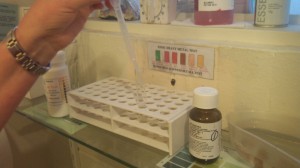Many people come into the clinic with unexplained infertility, and while the reasons may be complicated and numerous, here are six problems we see in infertility patients their doctors have overlooked.
1. MTHFR Gene Mutation
This can get very technical, but in layman’s terms, MTHFR is what converts the folate in your diet into the active form your body needs (called 5-Methyltetrahydrofolate). When there is a mutation on this gene, folate cannot be converted and your body is starved of it. As you probably already know, folate has been touted as the most important vitamin for the proper development of a baby in pregnancy. This is especially true for the first few weeks of pregnancy, when the spinal column is developing. 1 in 4 people have a defective MTHFR gene and if left undiagnosed, may lead to a variety of pregnancy related issues including difficulties conceiving, unexplained infertility, elevated homocysteine levels,recurrent miscarriages, preeclampsia, postpartum depression, or even the development of chronic depression.
If you have been struggling to get pregnant, have experienced recurrent miscarriages or any of the other pregnancy related issues mentioned previously, tell your Health Practitioner who can send you to pathology for specific blood tests including a MTHFR genetic test and blood homocysteine level. This should be done before you try to get pregnant again.
Although at first it feels quite scary and hopeless to be diagnosed with a genetic defect, this one is quite common. Fortunately there are things you can do naturally to increase your chances of natural conception, carrying a healthy pregnancy to term, preventing postpartum depression and protecting your health overall, since MTHFR gene defect impacts many areas of health.
General Guidelines for Managing MTHFR defective gene:
- Eat organic, this will help reduce overall toxic load.
- Avoid supplementing with synthetic folic acid, and talk to your Health Practitioner about the best prenatal vitamins for you, specifically ones containing methylated folate or folinic acid.
- Eat a diet rich in naturally occurring folate, such as uncooked dark leafy green vegetables, lentils, beans, liver, and avocado.
- Consider supplementing with carnitine, CoQ10 Ubiquinol, cod liver oil, probiotics and an antioxidant blend. Again, talk to your Health Practitioner before self-prescribing.
- At each meal, eat a variety of whole foods and be sure to include a protein.
- Make sure all the B vitamins you supplement are from a whole food source and provide the methylated form (active). For vitamin B6 this would be Pyridoxal 5-Phosphate or P5P; for Vitamin B12 this is methylcobalamin.
- Avoid regularly consuming both black and green tea, as they may inhibit folic acid absorption.
- Avoid antacids, these inhibit folic acid absorption as well.
If you have tested positive for MTHFR gene mutation, we highly recommend learning more from one of our trained naturopaths who can give you much more specific information and advice.
2. Vitamin D Deficiency
 Some of you may have heard of Vitamin D, some of you not. Vitamin D is a steroid hormone that influences virtually every cell in your body and a recent study published in The Journal of Nutrition found that in vitamin-D-deficient female rats, fertility was reduced by an astounding 75%, litter sizes were diminished by 30%, and there was impaired neonatal growth in offspring.
Some of you may have heard of Vitamin D, some of you not. Vitamin D is a steroid hormone that influences virtually every cell in your body and a recent study published in The Journal of Nutrition found that in vitamin-D-deficient female rats, fertility was reduced by an astounding 75%, litter sizes were diminished by 30%, and there was impaired neonatal growth in offspring.
Vitamin D is so crucial to health that we urge everyone to make sure their levels are optimized, but if you’ve been dealing with infertility, this is especially important.
As the researchers reported in the European Journal of Endocrinology:
- Among women, vitamin D appears to impact in vitro fertilization (IVF) outcomes, endometriosis, polycystic ovary syndrome (PCOS), the most common female endocrine disorder, as well as boost levels of progesterone and estrogen, which regulate menstrual cycles and improve the likelihood of successful conception
- In men, vitamin D is essential for the healthy development of the nucleus of the sperm cell, and helps maintain semen quality and sperm count. Vitamin D also increases levels of testosterone, which may boost libido
The researchers state:
“Given the high prevalence of infertility as well as vitamin D insufficiency in otherwise healthy young women and men and the possible role of vitamin D in human reproduction, research might lead to new therapeutic approaches such as vitamin D supplementation in the treatment of female and male reproductive disorders.”
If you are struggling with unexplained infertility, it’s most important you get your Vitamin D levels checked and then talk to us about the most effective way to get your levels back up.
3. Heavy Metals
Generally speaking, heavy metals disrupt metabolic function in two basic ways:
- First, they accumulate and thereby disrupt function in vital organs and glands such as the heart, brain, kidneys, bone, liver, etc.
- Second, they displace vital nutritional minerals from where they should be in the body to provide biological function. For example, enzymes are catalysts for virtually every biochemical reaction in all life-sustaining processes of metabolism. But instead of calcium being present in an enzyme reaction, lead or cadmium may be there in its place. Toxic metals can’t fulfill the same role as the nutritional minerals, thus their presence becomes critically disruptive to enzyme activity. Obviously, the enzymes and biochemical processes involved in fertility are included in this.
FOR EXAMPLE: Lead has been found to affect calcium, iron, manganese, selenium and zinc leading to reproductive failure, slow infant development, and damage to sperm, sterility and impotence.
Heavy metals have also been linked to malformation and abnormalities in the foetus as well as developmental concerns including autism in children whose parents (particularly the mother had high heavy metal loads during pregnancy). Researchers believe a lot of the damage caused to developing babies and children due to heavy metals exposure begins and happens whilst in utero, in addition to some links to certain vaccines which are preserved with mercury and may contain other heavy metals as well as polluted fish, water and other environmental exposure.
Clearing Heavy Metals
 Clients can get help in testing for and clearing heavy metals, and we always encourage prospective mothers to address the possibility of heavy metal accumulation as a source of infertility. We also encourage the minimizing of exposure to heavy metals to ensure the safest pregnancy and healthiest baby possible.
Clients can get help in testing for and clearing heavy metals, and we always encourage prospective mothers to address the possibility of heavy metal accumulation as a source of infertility. We also encourage the minimizing of exposure to heavy metals to ensure the safest pregnancy and healthiest baby possible.
Either hair analysis or urine analysis can be an excellent way to determine whether heavy metals have accumulated in your body, and these tests can be arranged at our clinic. There are a range of herbal products and vitamins and minerals that can then clear or significantly reduce heavy metal accumulation and ensure your body is in peak optimal health for conception.
4. Vitamin C and Zinc Deficiency
Vitamin C and Zinc levels need to be high in couples looking to conceive, and this is why.
Zinc
Zinc is the most widely studied nutrient in terms of fertility for both men and women. It is an essential component of genetic material and a zinc deficiency can cause chromosome changes in either you or your partner, leading to reduced fertility and an increased risk of miscarriage. Zinc is necessary for a woman’s body to ‘attract and hold’ (utilise efficiently) the reproductive hormones, oestrogen and progesterone.
And it’s equally important for male partners: zinc is found in high concentrations in the sperm. Zinc is needed to make the outer layer and tail of the sperm and is, therefore, essential for the health of sperm and, subsequently, your baby. Interestingly, several studies have also shown that reducing zinc in a man’s diet will also reduce his sperm count.
Vitamin C
Vitamin C is an antioxidant, and studies show that vitamin C enhances sperm quality, protecting sperm and the DNA within it from damage. Some research has indicated that certain types of DNA damage in the sperm can make it difficult to conceive in the first place, or it can cause an increased risk of miscarriage if conception does take place. If DNA is damaged, there may be a chromosomal problem in the baby, should the pregnancy proceed. Whether or not DNA damage does have these effects has not been conclusively proven, but it’s worth taking vitamin C and other antioxidants as a precautionary measure.
Vitamin C also appears to keep the sperm from clumping together, making them more motile. One study has shown that women taking the drug clomiphene to stimulate ovulation will have a better chance of ovulating if vitamin C is taken alongside the drug. Clomiphene does not always work in every woman, but the chances are often increased when vitamin C is supplemented.
5. Mobile Phones In Pockets
Men who keep a mobile phone in their trouser pocket could be inadvertently damaging their chances of becoming a father, according to a new study. Scientists at the University of Exeter said their work suggested that exposure to radio-frequency electromagnetic radiation from mobile phones negatively affected sperm quality, and previous studies have suggested that radio-frequency electromagnetic radiation emitted by the devices can have a detrimental effect on male fertility.
It is thought the radiation causes DNA fragmentation in sperm, as shown in the Journal of Endocrinological Investigatio, which concluded from its study, “Sperm DNA fragmentation significantly altered in the subjects who use the mobile phone for more than 4 hours for day and in particular for those who use the device in the pocket of the trousers.”
More studies in the International Journal of Occupational Medicine and Environmental Health concluded that mobile phones adversely affect the quality of semen by decreasing mostly motility but also the sperm counts, viability and morphology.
To be on the safe side, avoiding exposure is the best way to protect fertility long-term.
Here are some tips to follow:
- Use a mobile phone’s speaker wherever possible—without ever sitting it on your lap.
- NEVER carry a mobile phone that is switched on in your pocket.
- At night avoid having your mobile phone by your bedside table; invest in a battery operated alarm clock (anything that plugs into a wall also emits EMR)—in addition to directly impacting fertility EMRs also negatively impact restful, regenerative, hormonal balancing sleep, which is another way fertility becomes compromised through exposure.
- For men, be a trend-setter and acquire a “man bag” or very fashionable indeed “satchel” to carry your personal belongings including your mobile phone.
- Use radiation reducing mobile phone covers to decrease your exposure.
6. Testicular Varicocele
A varicocele is a varicose vein of the testicle that can cause pain and can stop or reduce the semen getting through. Among infertile couples, 30 % of men have varicoceles. Some experts believe these blocked and enlarged veins around the testes cause infertility by raising the temperature in the scrotum and decreasing sperm production. Basically, what we know is that there is a large association between varicoceles and infertility — we see decreased sperm count, decreased motility of sperm and an increase in the number of deformed sperm are related to varicoceles.
This is just another reason its imperative men get their sperm checked – infertility is 50% a male problem, after all.


